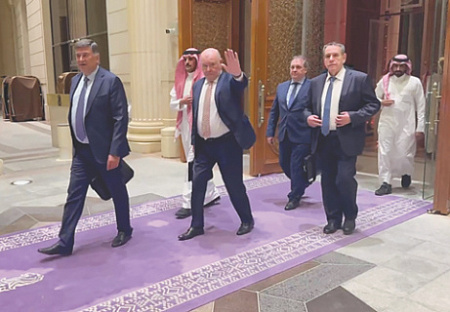
The series of consultations on the conflict between Moscow and Kiev, which took place in Saudi Arabia, in which representatives of the United States, Russia and Ukraine participated, has ended. According to the White House press service, “the United States and Russia have agreed to ensure safe navigation, exclude the use of force and prevent the use of commercial vessels for military purposes in the Black Sea.” A similar agreement was allegedly reached with Ukraine. The United States will also help restore Russia’s access “to the global agricultural and fertilizer export market, reduce the cost of marine insurance, as well as expand access to ports and payment systems for such transactions” and develop measures to stop attacks on energy infrastructure facilities. This is not a truce, but a step towards it.
There were initially few specifics in the statements made by officials of the three countries ahead of the talks in Riyadh. Russian Presidential spokesman Dmitry Peskov said that the Russian Federation and the United States plan to discuss the resumption of the Black Sea Initiative, which ceased to exist two years ago, a grain deal involving the safe transit of agricultural products through the Black Sea. She was not mentioned at all in the Ukrainian statements. “We discussed key issues, particularly in the energy sector,” Ukrainian Defense Minister Rustem Umerov succinctly described his talks with the Americans in Riyadh on Sunday.
At the same time, the US president’s special representative for Ukraine, Keith Kellogg, said that indirect talks between Moscow and Kiev were planned in Saudi Arabia, in which Washington was assigned only the role of mediator. According to him, the discussion should have focused not on the grain deal, but on a more global issue: the conditions for the cessation of hostilities.
“We will put the so-called technical groups in the so-called indirect talks in Saudi Arabia, where both sides will come, be placed in different rooms, and you essentially say, ‘OK, what are your terms?’ And you ask the other side, “What are your terms?” In fact, this is shuttle diplomacy between rooms in Riyadh,” Kellogg said in an interview with American conservative journalist Glenn Beck.
If that was the original idea of the Donald Trump administration, then it must be admitted that it was not a complete success. The talks between the Ukrainian and American delegations were held in Riyadh on Sunday, March 23 – that is, a day before the Russian-American meeting. Representatives of the Russian Federation and the United States talked for as long as 12 hours. The composition of the participants in the negotiations did not indicate that anything other than Ukraine could be in the spotlight. Suffice it to say that on the Russian side, the delegation included Grigory Karasin, Chairman of the Federation Council Committee on International Affairs, and Sergei Beseda, Adviser to the Director of the FSB, both of whom had long worked on the Ukrainian direction of Russian foreign policy.
The CBS News television company, citing two sources in the White House, reported that on Tuesday, at 11 a.m. Moscow time, a joint statement would be made following the talks between the Russian Federation and the United States. However, it did not follow. Instead, it became known that on Tuesday, in the same place, in Riyadh, the Ukrainian-American negotiations resumed. They lasted for several hours.
Sergey Chizhov, First Deputy Chairman of the Federation Council Committee on Security and Defense, spoke on the Rossiya 24 TV channel about why the delegations of the Russian Federation and the United States did not make a joint statement. “They sat for 12 hours and seemed to have agreed on a joint statement, which, however, was not accepted because of Ukraine’s position,” he said, without specifying what exactly the Ukrainians were not satisfied with.
According to Peskov, public explanations from the Kremlin should not be expected. “After all, we are talking about technical negotiations. Technical negotiations are negotiations with immersion in details, so, of course, the content of these negotiations will definitely not be made public,” said the press secretary of the President of the Russian Federation. Peskov did not say what further actions might be in the ongoing Russian-American negotiation process.
The expectations, at least, of the Trump team can be judged by what Michael Waltz, Assistant to the President of the United States for National Security, said earlier about the negotiations in Saudi Arabia. According to him, the Americans see the “grain deal” and the accompanying partial cessation of hostilities in the Black Sea as the first step in stopping the bloodshed. Next, there should be a complete freezing of the conflict and discussion of “the details of a permanent and lasting peace, what Ukrainians call security guarantees.”
It should also be added that President of Ukraine Volodymyr Zelensky announced at a press conference in Helsinki on March 19 that a list of “infrastructure, civil and energy facilities” that Russia should not attack would be prepared. The moratorium on strikes against certain targets was discussed during a telephone conversation between Trump and Vladimir Putin. The reports on their conversation, which were given from the Russian and American sides, differed. The Russian one talked about a mutual refusal for 30 days from strikes on the energy infrastructure. And the White House said in a statement: “the leaders agreed that the movement towards peace will begin with the cessation of attacks on infrastructure and energy,” that is, on two types of facilities, not one. As we can see, Zelensky’s words are closer to the American interpretation of the agreement between the two presidents. Perhaps Ukraine was just not satisfied with the fact that the Ukrainian list was not approved at the talks in Riyadh.
In any case, after the meetings in Saudi Arabia, we can say that the negotiation process is progressing. This alone cannot but inspire optimism about the prospects for the end of hostilities.
